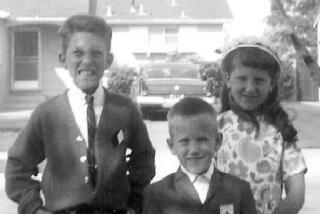Residents to Take a Look Back at Old Canoga Park
Jean and Jim Jauck are not from founding families, but they will be at the Canoga Park Womenâs Club on Sunday when the community celebrates its 90th birthday.
Sixty-nine-year-old Jean Jauck is a past and future president of the Canoga-Owensmouth Historical Society. Jim Jauck, 70, is director of the communityâs modest history museum, housed in former Los Angeles City Fire Station No.72.
A retired engineer, Jim Jauck greets visitors who straggle in on the second and fourth Sunday of the month, when the museum is open to the public.
He points out such local treasures as the so-called Owensmouth baby, a little plaster-of-Paris plaque featuring a stork carrying an infant from its beak.
In 1912, the Janns Investment Co. gave the plaques as mementoes to anyone who bought a lot in its new community, called Owensmouth. Owensmouth was then the âbabyâ community in the San Fernando Valley--following the creation of Van Nuys and Marian, later renamed Reseda.
Only two of the plaques are known to exist. Local history is made of such modest artifacts, and the passion of people like the Jaucks.
There are about 100 active members in the historical society, all of whom cherish such small treasures as the artifacts in the museum related to Clara Rooksby.
Miss Clara Rooksby, as the Jaucks always call her, was one of three original teachers at Owensmouth High School, later Canoga Park High School. The community changed its name in 1931 to Canoga Park. She also founded the local library.
Rooksby died in 1967, at 103, and the museum now has her Victrola, which visiting children love to see wound up and hear played.
According to the Jaucks, who live in West Hills, children are also intrigued by the mustache cup and apple corer on display.
When Jean Jauck is tending the museum, she often points to a compact black machine on display and asks young visitors if they know what it is. They rarely do.
âItâs a typewriter,â she tells them. âTheyâre used to computers, and a typewriter is a thing of the past.â
A white egg in one of the cases also fascinates visitors. It is a reminder of the Charles Weeks Poultry Colony, an experiment begun in 1922 by a 50-year-old philosopher and entrepreneur.
Weeks urged families to find happiness and economic salvation by plunking down $1,500 for a one-acre plot in what residents continue to call Winnetka. They could live on the land and raise chickens on it, then sell their eggs--newly fashionable white eggs.
âWe have people in our organization who lived in Weeks Colony,â Jean Jauck said.
The Canoga Park Womenâs Club founded the museum in 1987, to mark the communityâs 75th birthday. Jean Jauck gives the group much of the credit for documenting the communityâs past.
âI think, as citizens, we tend to neglect our heritage,â she said. âI think itâs important to remember your heritage and your roots. Otherwise, [where you live] is just a place.â
Historian and âOwensmouth babyâ Catherine Mulholland will speak Sunday at the Womenâs Club at 7401 Jordan Ave. between 2 and 4 p.m. A special invitation to the event, which is open to the public, has been extended to members of the founding families of Canoga Park.
*
Mulholland Family Had Part in Areaâs History
Mulholland, whose books include âWilliam Mulholland and the Rise of Los Angeles,â is the granddaughter of the L.A. water czar.
âThe town was 11 years old when I was born,â said Mulholland, 79, whose birth was announced in the Owensmouth Gazette.
The ranch owned by her father, Perry Mulholland, and mother, Addie Haas Mulholland, is now the site of a Northridge Kmart.
âI told my mother, who was one of the original settlers, âYou know, I think Iâd like to write something about the early days of Owensmouth,ââ Mulholland recalled. âAnd she said, âHow in the world are you going to make that interesting?ââ
Her motherâs remark, Mulholland said, âdoes capture an attitude toward history thatâs shared by many people.â
As people grow older, Mulholland found, they tend to become more interested in the past of their own community: âWhen youâre young, youâre just too busy creating your own life to care.â
Mulholland said that her motherâs family moved to Owensmouth from Calabasas, then a rural community, because Owensmouth promised better schools and transportation (a trolley that once traversed the San Fernando Valley was already in the works).
âCivilization was coming and the amenities that civilization could provide--amenities that Calabasas didnât have,â she said.
Historical societies may be silly at times, Mulholland said, but they are also invaluable.
âWithout the local historical societies in Southern California, there would be a real vacuum in our history,â she said.
âThe world I knew is gone. The only way you can capture even a fragment of it, is through books, movies and historical societies.â
More to Read
Sign up for The Wild
Weâll help you find the best places to hike, bike and run, as well as the perfect silent spots for meditation and yoga.
You may occasionally receive promotional content from the Los Angeles Times.






